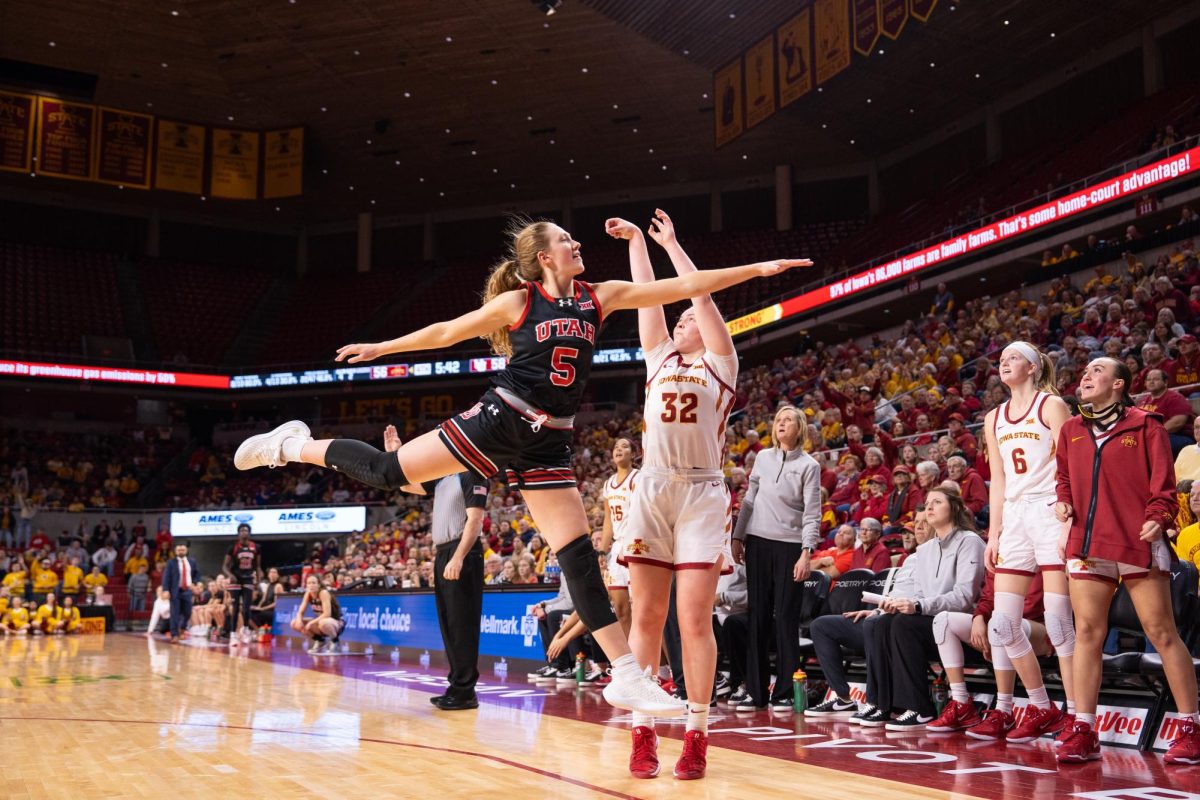Danny Peterson’s family finally finds solace
May 1, 2003
This is the fifth in a five-part series about the life and death of former ISU student Danny Peterson and how he impacted his family, friends and the detective who pushed everything aside to solve the case. In Thursday’s segment, police arrested a man after they were alerted by a Minnesota woman that her husband was possibly involved in Danny’s death.
In the months leading up to the Jan. 18 trial date, the Petersons had seen the face of the man who was suspected of killing Danny only in newspaper clippings. Seeing him in the flesh, as he walked into the courtroom in an orange jumpsuit, was an entirely different experience.
Chris can barely put into words how he felt. Ever since he heard about Guido Vivar-Rivera’s arrest, he had little but anger toward the man who had taken his brother’s life, and being in the same room with him brought the anger and the sadness of Danny’s death to a boil. The night of the accident was clear in his mind again, as well as the brother he hadn’t been able to see or talk to for so long. He wanted to take Guido aside and just ask questions that had no answers.
Why did you do what you did? How could you live with the guilt?
“It just hurts looking at him and thinking what he did,” Chris says.
One man’s bargain
Detective Jack Talbot stayed home that day. He was listed as a standby witness but he knew attorneys wouldn’t call him to the stand. He knew there would be no trial. Although the police had continued to bolster their case against Guido and gave a three-inch thick binder of reports and evidence to the county attorney’s office two weeks before trial, the prosecutor’s office had made up its mind: They wanted to seek a plea-bargain agreement. Talbot wanted no part of it.
“After doing this for 30 years, I think I know when we have a good case,” he says. “I think this was a provable case and I think we could’ve had a jury that would’ve convicted this gentleman very easily.”
The prosecutors had discussed the case and examined the evidence, says Assistant County Attorney Diane Krenz, and it didn’t seem possible to show Guido, who still maintained he didn’t know that night he had hit Danny, was a cause of the accident. Furthermore, the judge had expressed concerns that Guido’s testimony could be inadmissible because he might not have understood his rights, despite the presence of a certified interpreter during his questioning.
“A jury could reasonably find that [Guido] had no clue what he hit and then let him walk,” Krenz says. “There was just too much of a risk to take it to trial.”
The attorneys had met with Tim and Pat a few weeks before the trial with their case. It seemed “clear-cut” that there was not enough evidence to convict Guido of vehicular homicide, Pat says. The attorneys then met with Police Chief Bryan Litsey to tell them the Petersons were interested in a plea bargain. The police maintained their support for the vehicular homicide charge, but told the attorneys they would go along with what the Petersons wanted.
The prosecutors then told the Petersons the police were behind the plea bargain. Today, both the police and the Petersons believe the county attorney’s office did not portray the police department’s view accurately. Although the Petersons were already leaning toward the plea bargain, hearing the police supposedly also wanted a plea bargain sealed the deal.
“The way it was presented to us made it sound like they discussed this with the police and that [the police] agreed that this is the way it should be done,” Pat says. “When they said the police were on board, that’s all I really needed to hear. But it wasn’t really true.”
With the charge amended down to a felony hit-and-run, Guido entered a plea of guilty. His sentencing hearing was a month later, Feb. 18, 10 days before what would have been Danny’s 22nd birthday.
Hearts of forgiveness
Pat’s first impression of Guido on the day of the plea bargain and then at his sentencing hearing was he was “broken and hopeless.” Emotions ran high that day, but the family’s thoughts were not directed at Guido, Tim says, but at the son they had lost.
Pat gave a victim’s impact statement at the beginning of the hearing. Her reason for being there, she told the court, was “to remember Danny — who he was, how he lived and what we learned from him.”
“We were trying to help Guido know who Danny was,” Pat says of her testimony. “We wanted him to hear what Danny was like, if that could somehow inspire him to be a better person.”
Guido then delivered a prepared statement to the court through an interpreter. He faced the judge, his back to the Petersons. He looked at the ground often as he spoke.
“I never wanted to do any harm to anyone. That is why I feel responsible over this,” he said. “And from the bottom of my heart, I honestly want to ask for your forgiveness and I would like you to truly forgive me. I am not a bad person and I’ve never wanted to harm anyone.”
Judge Francis Connolly then delivered the sentence.
Based on Guido’s remorse, the circumstances of the crime and his lack of criminal record, he sentenced Guido to 320 days in the Hennepin County Adult Correctional Facility.
The light sentence, Connolly said, “in no way should take away from the terrible tragedy that the Peterson family and their friends have suffered … As the father of three children myself, one of whom is almost of college age, I truly cannot imagine what you are going through.”
The sentence was received with mixed reaction.
Ben Bergherr, who was with Danny at his final steps, had written a victim impact statement to Connolly, stating he had forgiven Guido but that the maximum sentence should be imposed because of Guido’s decision to flee. Pat and Tim say their friends, including some mothers of Danny’s friends, had expressed their shock to them about the sentence.
But the Petersons already guessed the sentence would be light. To them, the actual sentence was mostly an afterthought. They felt Guido had already paid for his mistake. He had lost his wife, his home and a year of his life — and that was enough for the Petersons.
“I don’t think you want to break another human being,” Pat says. “There’d be no point in him living like he died that night too.
“He still has his life and we want him to do what he can. And that’s how he can redeem himself.”
Epilogue
Today, Excelsior Boulevard is much the same road it was when Danny walked on it — with a few additions. Street signs were put up that read, “Please slow down. We live here.” An extra street lamp has been installed close to where Danny was hit. One of Talbot’s friends built a cross, which the Petersons placed at the spot in memory of Danny.
The Petersons filed a lawsuit against the St. Albans Boathouse in January, for damages in excess of $55,000, due to negligence leading to Danny’s death. The Petersons believe the restaurant should be held accountable for Guido’s drinking and driving that evening. Although Guido admitted to having several drinks, his co-workers told police he was served only one drink, and he then was left to his own with an open bar.
“The criminal justice system didn’t have any further interest with the Boathouse,” Tim says. “So the only way we were going to know the truth out there was to bring a civil suit.”
The Petersons have created a scholarship for the ISU chapter of Alpha Tau Omega fraternity in Danny’s name, and an annual Frisbee golf tournament will be held every year honoring him. The first one was held April 26. It brought in nearly $1,000, which was donated to Mothers Against Drunk Driving.
Guido finished his sentence at the Hennepin County workhouse April 4. At the time this article was written, he was waiting to be taken into custody by the Immigration and Naturalization Service for deportation.
The South Lake Minnetonka Police Department still believes Guido could have been convicted on the vehicular homicide charge, but is satisfied the Petersons are content with his punishment.
“I don’t know of anything we would’ve changed or done differently as far as the investigation,” Talbot says. “We left no stone unturned. We like to think that’s how we do the job every day.”
The Petersons never did meet Christina Vivar, the woman whose admission closed the case. Before they left for vacation, on the day of Guido’s arrest, they left a statement praising her for her courage. Christina sent them a bouquet after the arrest. One night, the Peterson’s phone rang; Christina’s name was on the caller ID. When Pat picked it up, the woman on the other end said she had the wrong number and hung up.
“I think she must have gotten scared,” Pat says.
Christina declined to return calls for comment for this series.
Chris is now finishing his freshman year at Iowa State. Danny’s death gave him doubts about attending his brother’s university. Chris had visited Iowa State several times before and enjoyed it every time. Without Danny, though, it wasn’t the same. But Chris finally decided going to Iowa State was what he wanted to do. And what Danny would have wanted.
“He’d want me to follow through on what I planned on,” Chris says. “He wouldn’t want me to lose hope on what I planned on doing.”
Chris did not, however, join the Alpha Tau Omega fraternity his first semester as he had planned on doing. It hurt to even just drive past the fraternity house during orientation and see the deck where he and Danny partied together. Pat and Chris didn’t stop in or say hello to any of the brothers — they did as little as they needed to do at orientation to get Chris ready for school and left early.
The fraternity brothers loved Chris whenever he visited. They saw he had the same kind of friendliness Danny had. Chris realized on his own that the place where Danny lived for three years was where Chris could find the best support group he could want.
He spent time with the brothers almost every weekend, and when news of Guido’s arrest broke, they were the people at Iowa State he could talk to about it. Chris joined the house in the spring.
Almost every night Danny’s name is mentioned in conversation. On some nights there would be tears, but always the stories of Danny and his antics would put a smile to their faces. Chris remembers at first the brothers were sometimes hesitant to mention Danny or show the many pictures they have of him to Chris.
“But then I let them know, the more stories they tell me, the better,” Chris says. “It’s the more I know about my brother that I never got to see.”
There is still some anger in Chris about what happened to Danny and the light sentence Guido received. But it has mostly passed.
Danny lived his life not letting anger get to him, Chris says. And that is what he wants to do.
“I’m not going to think about [Guido] my whole life,” Chris says. “I’m going to think about the life my brother had, and how good of a kid he was and how people loved him. And how much he meant to all of us.
“He’s never going to leave my mind.”
About this series
This series was inspired by a Minneapolis Star-Tribune July 12 article headlined, “Who struck down Danny Peterson? A detective won’t let go,” about a Minnesota police department and its almost obsessive search for the driver who killed Danny.
The Daily learned from the Star-Tribune and the South Lake Minnetonka Police Department in February that the driver had been arrested and sentenced. This prompted the Daily to find out the complete story behind what happened to Danny.
The events surrounding his life and death are derived from the accounts of 10 of the major people involved, including Danny’s family and the detectives working his case. The Daily also visited the Peterson home and the spot where Danny’s accident took place.
Articles from Minnesota newspapers, the transcript of the sentencing hearing, the text of Danny’s eulogy and victim impact statements to the judge were also sources for this story.






